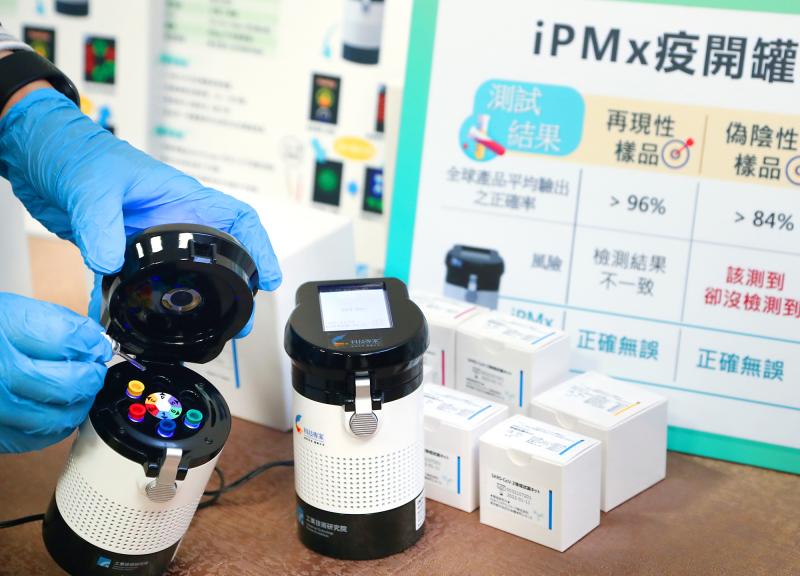The developer of the iPMx molecular rapid COVID-19 test system has received the first overseas order for the new product, from Japan, the Ministry of Economic Affairs said yesterday.
Industrial Technology Research Institute (ITRI, 工業技術研究院), which says that its iPMx system can accurately and efficiently detect SARS-CoV-2, has received an order for 100 test kits and 10,000 reagents from Japan Biotechno Pharma Co, the ministry said, adding that the order came as Japanese authorities, effective immediately, approved the product.
The authorities approved its use at small and medium-sized hospitals and clinics, as well as operating and emergency rooms at major hospitals, Department of Industrial Technology Director-General Chiou Chyou-huey (邱求慧) told a news conference in Taipei.

Photo: CNA
Technology developed for the test kit would be produced by BizLink Holding Inc (貿聯控股) in California as part of ITRI’s efforts to expand cooperation with foreign partners, Chiou said.
The iPMx system’s compact canister is 57 times lighter than traditional testing devices, weighing only 600g, ITRI said.
The system produces results within an hour, one-quarter of the time a polymerase chain reaction test takes, and is 95.8 percent accurate, it said.
Chiou said the system is like a “mobile laboratory” and is highly sought after in the Japanese testing market.
ITRI’s next step would be entering the markets in Southeast Asia, Europe and the US, he said, adding that the institute is in talks in such countries.
ITRI is developing a second-generation iPMx system, which would also be able to detect flu, Chiou said.

MULTIFACETED: A task force has analyzed possible scenarios and created responses to assist domestic industries in dealing with US tariffs, the economics minister said The Executive Yuan is tomorrow to announce countermeasures to US President Donald Trump’s planned reciprocal tariffs, although the details of the plan would not be made public until Monday next week, Minister of Economic Affairs J.W. Kuo (郭智輝) said yesterday. The Cabinet established an economic and trade task force in November last year to deal with US trade and tariff related issues, Kuo told reporters outside the legislature in Taipei. The task force has been analyzing and evaluating all kinds of scenarios to identify suitable responses and determine how best to assist domestic industries in managing the effects of Trump’s tariffs, he

TIGHT-LIPPED: UMC said it had no merger plans at the moment, after Nikkei Asia reported that the firm and GlobalFoundries were considering restarting merger talks United Microelectronics Corp (UMC, 聯電), the world’s No. 4 contract chipmaker, yesterday launched a new US$5 billion 12-inch chip factory in Singapore as part of its latest effort to diversify its manufacturing footprint amid growing geopolitical risks. The new factory, adjacent to UMC’s existing Singapore fab in the Pasir Res Wafer Fab Park, is scheduled to enter volume production next year, utilizing mature 22-nanometer and 28-nanometer process technologies, UMC said in a statement. The company plans to invest US$5 billion during the first phase of the new fab, which would have an installed capacity of 30,000 12-inch wafers per month, it said. The

Taiwan’s official purchasing managers’ index (PMI) last month rose 0.2 percentage points to 54.2, in a second consecutive month of expansion, thanks to front-loading demand intended to avoid potential US tariff hikes, the Chung-Hua Institution for Economic Research (CIER, 中華經濟研究院) said yesterday. While short-term demand appeared robust, uncertainties rose due to US President Donald Trump’s unpredictable trade policy, CIER president Lien Hsien-ming (連賢明) told a news conference in Taipei. Taiwan’s economy this year would be characterized by high-level fluctuations and the volatility would be wilder than most expect, Lien said Demand for electronics, particularly semiconductors, continues to benefit from US technology giants’ effort

‘SWASTICAR’: Tesla CEO Elon Musk’s close association with Donald Trump has prompted opponents to brand him a ‘Nazi’ and resulted in a dramatic drop in sales Demonstrators descended on Tesla Inc dealerships across the US, and in Europe and Canada on Saturday to protest company chief Elon Musk, who has amassed extraordinary power as a top adviser to US President Donald Trump. Waving signs with messages such as “Musk is stealing our money” and “Reclaim our country,” the protests largely took place peacefully following fiery episodes of vandalism on Tesla vehicles, dealerships and other facilities in recent weeks that US officials have denounced as terrorism. Hundreds rallied on Saturday outside the Tesla dealership in Manhattan. Some blasted Musk, the world’s richest man, while others demanded the shuttering of his